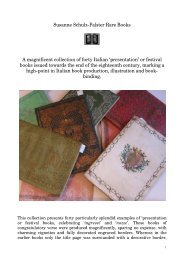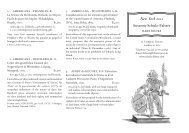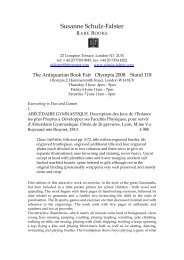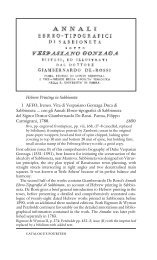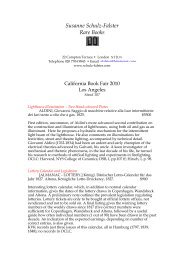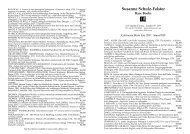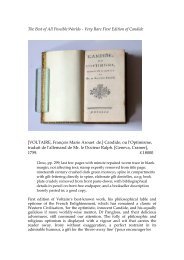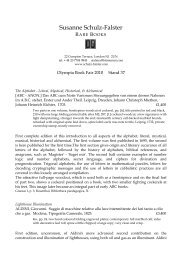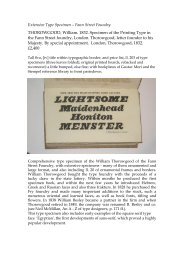Susanne Schulz-Falster Catalogue Ten - Schulz-Falster Rare Books
Susanne Schulz-Falster Catalogue Ten - Schulz-Falster Rare Books
Susanne Schulz-Falster Catalogue Ten - Schulz-Falster Rare Books
Create successful ePaper yourself
Turn your PDF publications into a flip-book with our unique Google optimized e-Paper software.
thirty-six page <strong>Catalogue</strong> d’une bibliothèque d’économie politique, formé pour le<br />
travail du nouveau Dictionnaire du commerce, which nearly two centuries<br />
later formed the basis of the Einaudi collection.<br />
Goldsmiths’–Kress 10507; Higgs 4565; Einaudi 4024; McCulloch p. 62; in addition<br />
to the Kress copy NUC lists copies at the Library of Congress, Yale, Library<br />
Company of Philadelphia, and Indiana University only.<br />
With a Bibliography of his Works<br />
220 MOSER, Johann Jacob. Lebensgeschichte Johann Jacob<br />
Mosers, von ihm selbst beschriben. [n.p.] [OVenbach], 1768. £550<br />
8vo, pp. [viii], [9]–216; typographic vignette to title, head and tailpieces;<br />
paper a little browned, title page loosened; contemporary buV<br />
boards, spine label lettered in manuscript; extremities a little rubbed.<br />
First edition of the autobiography of the ‘father of German law’, the proliWc<br />
Johann Jacob Moser (1701–1785). Moser was in succession a lawyer, a<br />
university professor at Tübingen and Frankfurt, a member of the government<br />
of Wurtemberg and a founder of an academy for political science in<br />
Hanau. He was imprisoned for his unwavering support of the estates-constitution<br />
of the duchy of Wurtemberg. Moser concludes with a bibliography<br />
of his publications, listing more than 220 individual works, not<br />
counting newspaper and journal articles: ‘ich habe so vil geschriben, als<br />
wenige andere Rechts-Gelehrte vor mir gethan und nach mir thun<br />
werden...’ (preface). Moser’s autobiography appeared also with a Frankfurt<br />
and Leipzig imprint, a third enlarged edition was published in 1777–1783.<br />
Goedeke IV, 1, 233; RLIN lists Berkeley, Harvard and the university of Rochester;<br />
see G. Kleinheyer & J. Schröder, Deutsche Juristen aus fünf Jahrhunderten, 1983, pp.<br />
194–198.<br />
German ‘Romantic’ Economist<br />
221 MÜLLER, Adam Heinrich. Die Elemente der Staatskunst.<br />
OeVentliche Vorlesungen vor Sr. Durchlaucht dem Prinzen Bernhard<br />
von Sachsen-Weimar und einer Versammlung von Staatsmännern<br />
und Diplomaten, im Winter von 1808 auf 1809, zu<br />
Dresden, gehalten. Berlin, J. D. Sander, 1809. £2800<br />
Three parts in one volume, 8vo, pp. xxviii, 298, 1 plate; [ii], 375, 1<br />
plate (pagination irregular, jumps from 366 to 369; [ii], 328, 1 plate<br />
(pagination irregular, jumps from 323 to 326); irregular pagination,<br />
but complete; very occasional light spotting and browning, else very<br />
clean; recent dark green morocco, spine in compartments, with giltlettered<br />
spine label, and numbering directly to spine, gilt dentelles; preserved<br />
in a custom-made cloth box; a Wne copy with book plate to front<br />
free endpaper and faint contemporary ownership inscription to title.<br />
First edition of the main contribution by the ‘most important political<br />
economist of the German Romantic school. Müller opposed the economic<br />
susanne schulz-falster rare books catalogue ten<br />
theories of Adam Smith and his successors, particularly their abstract and<br />
isolated understanding of the individual and their emphasis on self-interest.<br />
He also criticized Smith’s merely materialist notion of national wealth and<br />
formulated a concept of spiritual capital encompassing cultural values and<br />
the state of the sciences (books IV and V)’ (Hermann Reich in New<br />
Palgrave). Like Fichte, Müller requested economic self-suYciency as an important<br />
means of strengthening national unity. Müller can be seen as an<br />
early critic of capitalism, which he considered a threat to the viability of the<br />
absolute state. He objected to free enterprise, competition and free trade as<br />
violating the ideal of a self-suYcient and independent state.<br />
Humpert 1059; Kress B5552; Menger c 87; not in Einaudi or Goldsmiths’.<br />
Enlightenment Legal Reform<br />
222 MURATORI, Lodovico Antonio. Dei Difetti della<br />
Giurisprudenza. Venezia, Giambatista Pasquali, 1742. £850<br />
Folio in 4s, pp. [viii], 184; title printed in red and black, engraved title<br />
vignette, decorated initials; marginal tear to R1, no loss of text;<br />
contemporary marbled sheep-backed boards, spine ruled and decorated<br />
in gilt, gilt-lettered spine label, chipped; a Wne, wide-margined copy.<br />
First edition, uncommon, of Muratori’s criticism of jurisprudence, in fact<br />
the starting point of the critique of Roman law throughout the eighteenth<br />
century, resulting in far reaching judicial reforms and the drawing up of<br />
modern civil codes. In his treatise Muratori attacked the immobility of the<br />
Italian legislative apparatus, and criticised the vast and often contradictory<br />
accumulation of edicts, which made the execution of justice and power<br />
diYcult. His critique proved inXuential on the reformed Tuscan legislature<br />
and the presentation of the Codice Estense. The refusal of the curia to grant<br />
reform eventually resulted in the radical enlightenment reform movement.<br />
Muratori (1672–1750), archivist and librarian in Modena, was one of<br />
the greatest scholars of his time and published extensively in the Welds of<br />
history, philosophy, and political economy. This criticism of the legal system<br />
proved poplar, further editions followed in 1743, 1744.<br />
L’Illuminismo Italiano alla Fondazione Feltrinelli 367; Sorbelli I, 154; OCLC and<br />
RLIN list copies at Library of Congress, Harvard, Minnesota and Washington<br />
University.<br />
223 [MURATORI, Lodovico Antonio.] Primo Esame del Libro<br />
intitolato dell’Eloquenza Italiana. n.p., n.d. [between 1736 and<br />
1740?]. £420<br />
4to, pp. [ii], 62; contemporary buV boards, spine chipped, recent label<br />
untidily removed from upper board; a wide-margined copy, with<br />
manuscript annotations to title page.<br />
First separate edition, uncommon, of this forceful polemic against Giusto<br />
Fontanini, written in response to the latter’s criticisms of Muratori’s Vita ed



